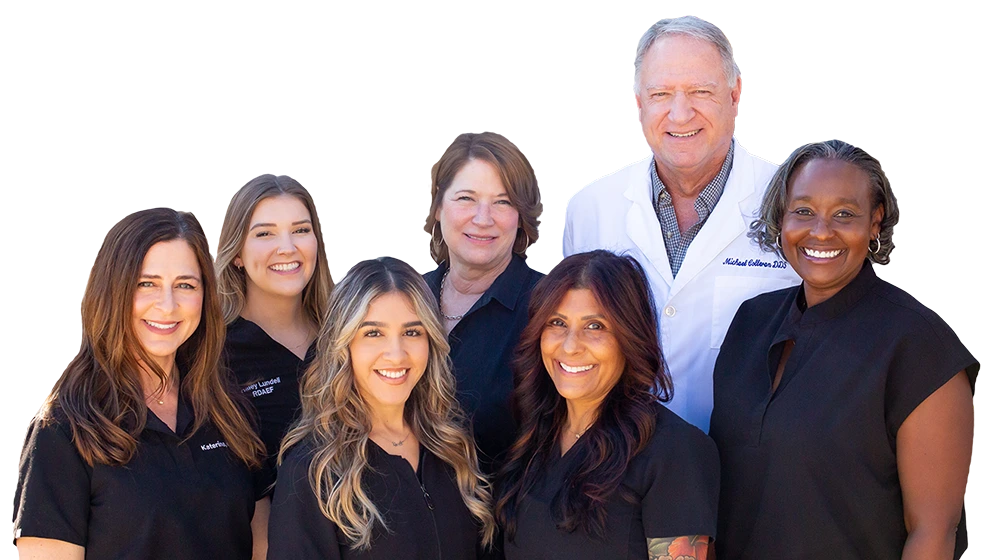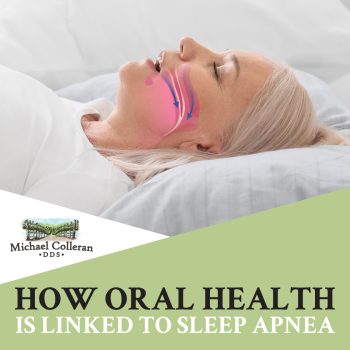Blog

How Oral Health is Linked to Sleep Apnea
 Sleep apnea is more than just a sleep disorder; it can significantly impact your overall health, including your oral health. In this article, we’ll explore the surprising connection between sleep apnea and oral health, the causes of this condition, and how dentists like Dr. Michael Colleran can help manage it effectively.
Sleep apnea is more than just a sleep disorder; it can significantly impact your overall health, including your oral health. In this article, we’ll explore the surprising connection between sleep apnea and oral health, the causes of this condition, and how dentists like Dr. Michael Colleran can help manage it effectively.
Understanding Sleep Apnea and Its Causes
Sleep apnea occurs when breathing is repeatedly interrupted during sleep, often due to a blocked or narrowed airway. There are different types of sleep apnea, with Obstructive Sleep Apnea (OSA) being the most common. OSA is often linked to factors such as excess weight, neck anatomy, and oral health conditions.
Obstructive Sleep Apnea and Oral Health Factors
Oral health plays a significant role in OSA. Issues like misaligned jaws, large tonsils, or a narrow dental arch can contribute to airway obstruction during sleep. A significant factor in OSA occurs when the muscles relax during sleep, particularly the tongue muscle, which may fall back into the throat and block or narrow the airway, disrupting airflow. Additionally, certain oral habits and conditions, such as bruxism (teeth grinding), are often seen in individuals with sleep apnea.
The Oral Health Connection to Sleep Apnea
The relationship between oral health and sleep apnea is a two-way street. While sleep apnea can affect oral health, oral health issues can also contribute to sleep apnea symptoms.
Jaw Alignment and Airway Obstruction
The alignment and growth of your jaw play a crucial role in maintaining a clear airway. When the jaw is positioned too far back or has insufficient growth, it can reduce the volumetric space available for airflow, significantly increasing the risk of airway collapse during sleep. Proper jaw development and alignment are essential for creating adequate space in the airway, ensuring unobstructed breathing during sleep.
Teeth Grinding (Bruxism) and Sleep Apnea
Teeth grinding, or bruxism is often associated with sleep apnea and serves as the body’s way of responding to interrupted breathing during sleep. Grinding activates the muscles in the mouth and throat, helping to retain muscle tone and prevent the airway from collapsing or narrowing. This mechanism aligns with treatments like the Inspire medical device, which stimulates the hypoglossal nerve to maintain airway openness. However, prolonged bruxism can lead to tooth damage, jaw pain, and gum issues, further compounding oral health concerns related to sleep apnea.
How Dentists Help Manage Sleep Apnea
Dentists like Dr. Colleran, trained in sleep medicine, can play a vital role in diagnosing and treating sleep apnea. Through specialized dental treatments, they can help improve symptoms and overall quality of life.
Oral Appliance Therapy for Sleep Apnea
One of the most effective dental treatments for sleep apnea is oral appliance therapy. These custom-made devices reposition the jaw or tongue to keep the airway open during sleep. They are a non-invasive alternative to CPAP machines and are often easier for patients to use consistently.
Benefits of Early Intervention
Early intervention at Michael Colleran, DDS, can prevent the progression of sleep apnea and associated complications. By addressing underlying oral health issues such as jaw alignment or teeth grinding, patients can experience better sleep, reduced health risks, and improved overall well-being.
Sleep apnea and oral health are closely intertwined, with each influencing the other in profound ways. If you suspect that sleep apnea or oral health issues are affecting your quality of life, contact Michael Colleran, DDS, for a consultation. With advanced dental solutions, you can breathe easier, sleep better, and protect your oral health.
Disclaimer: The content of this blog is not intended to be a substitute for professional medical advice, diagnosis, or treatment. Always seek the advice of qualified health providers with questions you may have regarding medical conditions.










